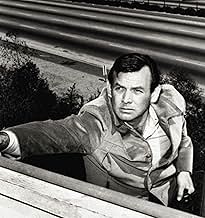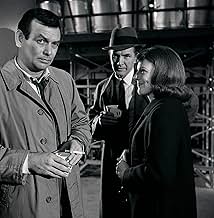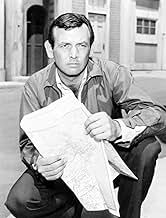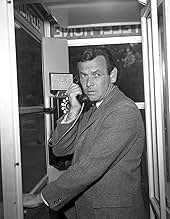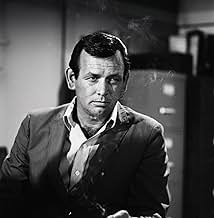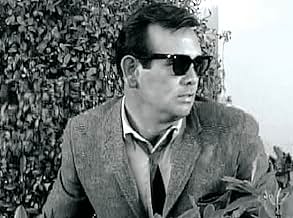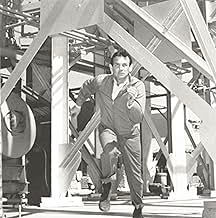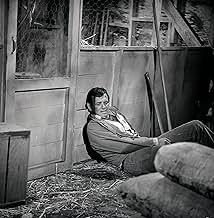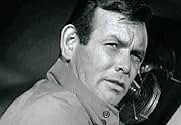Un médecin, condamné à tort pour un meurtre qu'il n'a pas commis, échappe à la garde à vue et doit retrouver le véritable tueur.Un médecin, condamné à tort pour un meurtre qu'il n'a pas commis, échappe à la garde à vue et doit retrouver le véritable tueur.Un médecin, condamné à tort pour un meurtre qu'il n'a pas commis, échappe à la garde à vue et doit retrouver le véritable tueur.
- A remporté 1 prix Primetime Emmy
- 5 victoires et 10 nominations au total
Avis en vedette
Still, it was an appropriate choice as Richard Kimble spent four years in his own, personal 'Twilight Zone'. If you look at most of the classic episodes of the earlier show, they involve a troubled hero finding himself in a world that doesn't seem to make any sense any more. He convinces himself if he can figure it out, or find a way out of it, things will be OK again. But he never seems to make it- just like so many of our dreams. Kimble's world is shattered by an argument with his wife and her subsequent murder. He's on the run in his own country, now suddenly hostile to him. He has to suppress his emotions and hide his identity while he pursues 'the way out': the one-armed man; and avoids pursuit by Lt. Gerard, the symbol of all his fears. Goldsmith's music was very well used.
I heartily agree with those that rank this as the best TV series ever. Leonard Goldenson was right: it's the best concept for a show ever. Also the best execution. David Janssen's performance is amazing. He's deprived of most of an actor's tools: he keeps his head down and says as little as possible in order to avoid recognition. Yet he conveys this character's feeling perfectly. The tremendous array of guest actors, playing characters in their own little psychological prisons adds great depth to the show. The directing was sharp, well-paced and uncluttered with too many obvious 'techniques'. The writing was consistently good. Pete Rugolo's wonderful main musical theme could be played allegro for excitement or largo for poignancy- and this was the most poignant show ever. It was about psychological alienation. The only other shows I can think of that reached this deep were 'The Twilight Zone' and, occasionally, 'Star Trek'.
This was one of the few classic TV shows of which a movie version was later made that was any good at all. Roy Huggins, the creator of the show, had some input into the Harrison Ford film. That film, compared to the TV show, is rich in money, production values and excitement. It has flashes of characterization that give the action more meaning than most modern day flicks. However the TV was rich in time, with four years of hour long episodes to tell all its various stories. In the end that made it far more moving. If only the film could have been the ending of the TV show, ('The Judgment' is not really all that good, despite its historical ratings).
My dream ending for the show is Kimble leaving the courthouse and suddenly finding himself surrounded by the women who fell in love with him in all his travels, and then running down the street to escape from them! Actually, I think it would have been nice if he found Vera Miles and the boy from 'Fear in Desert City' waiting for him. That would have been the most poetic ending of all. I wonder what Goldsmith might have written for that.
An outstanding classic television series that needs to be presented in it's entirety in a DVD set. The movie version was a bunch of bloated, Hollywood tripe all to typical of whats been put out today.
Painstaking effort has been made to present DVD material of such crap as Full House, Saved by the Bell, etc, etc. I'll bet we'll see Love Boat come out next. Why no Fugitive?
This is absolutely unacceptable.
Such summarizes the huge effort Roy Huggins invested to get The Fugitive to television. Teaming with producer Quinn Martin, Huggins' concept was made flesh with the casting of David Janssen as Dr. Richard Kimble and British-born Canadian Barry Morse as his nemesis, Lt. Philip Gerard. Huggins and Martin worked to make a compelling weekly drama via superb scripts, top-notch guest casts, and enticing music by Peter Rugolo, and succeeded perhaps more than they ever dared to hope.
The Fugitive remains compelling television 40 years later. Janssen and Morse imbue tremendous sympathy into their roles and make their characters so compelling that audiences even went too far, assailing Morse by saying, "You dumb cop, don't you realize he's innocent?" It even extended to the one-armed vagrant who was key to the drama, played by stuntman Bill Raisch, who in one incident was even picked up by the real LAPD because they thought he was "wanted for something," before they realized he was just an actor.
If The Fugitive had a drawback, it was because it worked too well - it is emotionally draining watching the show because the sympathy enticed for the characters is so great that seeing them suffer is painful, such as in the two-part episode "Never Wave Goodbye" - the audience is put through the emotional wringer every bit as much as Kimble, Gerard, and the story's supporting players (in this case played by Susan Oliver, Will Kuliva, Robert Duvall, and Lee Phillips).
The series was shot in black and white in its first three seasons, but for the fourth season came the replacement of producer Alan Armer with Wilton Schiller and the switch to color. The quality of the series remained high, but it is a measure of the show's quality that early fourth-season episodes are considered disappointing, and yet are still excellent stories with genuine emotional pull. The fourth-season settled down when writer-producer George Eckstein was brought in early on to help out Schiller, and it helped bring about some of the series' best moments, notably in the episode "The Ivy Maze," where for the first time in the series, all three protagonists (Kimble, Gerard, and Fred Johnson, the one-armed man) confront each other.
The performances and all else within made The Fugitive TV's most compelling drama, then and forever.
Of course, the character of Richard Kimble was loosely inspired by Dr. Sam Sheppard. The major difference was that while Dr. Richard Kimble spent four years chasing the real killer (a one-armed man) of his wife Helen, Dr. Sheppard spent ten years in jail for the 1954 murder of his wife Marilyn.
It might be interesting to note that when Dr. Sheppard was acquitted in a second trial in November of 1966, 'The Fugitive,' which was then in the middle of its fourth season, began to slip in the ratings. For this reason, the producers were smart not to wait for the ax to fall and risk having the series cancelled without doing a finale.
"The Judgment," the two-hour series finale, aired in the summer of 1967. After four years of chasing and being chased, Kimble finally catches up with Fred Johnson, the one-armed man, who admits to having been Helen's real killer. He is then shot and killed by Lt. Gerard, who saves Kimble in the process.
While the finale was weak in some respects, it was generally a fitting conclusion to the 'Fugitive' series. Of course, it was also one of the highest rated TV finales of all-time.
Le saviez-vous
- AnecdotesThis was the first series to feature a "final episode" in which all the plot lines were resolved, and all questions answered. The Fugitive finale ranked for decades as the highest-rated TV episode of all time.
- GaffesHelen Kimble is shown in various flashbacks throughout the series as being beaten to death by Fred Johnson using the base of a lamp. Police would have found Johnson's fingerprints on it, and not Kimble's. But following this basic forensics procedure would have made this a single-episode series instead of four years.
- Citations
Narrator: The Fugitive, a QM Production, starring David Janssen as Dr. Richard Kimble, an innocent victim of blind justice, falsely convicted for the murder of his wife, reprieved by fate when a train wreck freed him en route to the death house; freed him to hide in lonely desperation, to change his identity, to toil at many jobs; freed him to search for a one-armed man he saw leave the scene of the crime; freed him to run before the relentless pursuit of the police lieutenant obsessed with his capture.
- Autres versionsThe final episode of the series aired on a different date in Canada (September 5 as opposed to Aug. 29 in the US). For Canadian prints of the final episode, the ending narration was changed to mention September 5. Some VHS releases of "The Judgement" released in the US retain the Canadian narration.
- ConnexionsFeatured in TV Guide: The First 25 Years (1979)
Meilleurs choix
Détails
- Date de sortie
- Pays d’origine
- Site officiel
- Langue
- Aussi connu sous le nom de
- Le fugitif
- Lieux de tournage
- Tucson, Arizona, États-Unis(pilot Episode)
- sociétés de production
- Consultez plus de crédits d'entreprise sur IMDbPro
- Durée51 minutes
- Couleur
Contribuer à cette page



